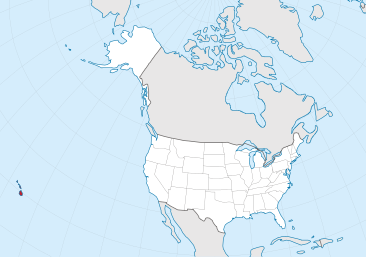The following outline is provided as an overview of and topical guide to the U.S. state of Hawaii:

Hawaii is the newest state among the 50 states of the United States of America. It is also the southernmost state, the only tropical state, and the only state that was previously an independent monarchy.
The state comprises the Hawaiian Islands (with the exception of Midway) in the North Pacific Ocean and is the only U.S. state that is not primarily located on the continent of North America.
General reference
edit- Names
- Common name: Hawaii
- Pronunciation: /həˈwaɪ.i/
- Official name: State of Hawaiʻi (use of ʻokina preferred, but not required), Hawaiian: Mokuʻāina o Hawaiʻi
- Abbreviations and name codes
- Nicknames
- Common name: Hawaii
- Adjectivals
- Demonyms
- Transitive verb
Geography of Hawaii
editGeography of Hawaii – Unlike the other states of the Union, Hawaii is a group of islands, located in the Pacific Ocean.
- Hawaii is: a U.S. state, a federal state of the United States of America
- Location
- Population of Hawaii: 1,455,271 (2020 U.S. Census[3])
- Area of Hawaii
- Atlas of Hawaii
- Places in Hawaii
Environment of Hawaii
editEnvironment of Hawaii
- Endemism in the Hawaiian Islands
- Environmental issues in Hawaii
- Climate of Hawaii
- Geology
- Superfund sites in Hawaii
- Wildlife of Hawaii
- Fauna of Hawaii
Geographic features of Hawaii
edit- Beaches of Hawaii
- Channels of the Hawaiian Islands
- Dams and reservoirs in Hawaii
- Leeward desert
- Manmade peninsula
- Mountain passes in Hawaii
- National Natural Landmarks in Hawaii
- Rivers of Hawaii
- Volcanoes of Hawaii
- Wilderness area
Natural Area Reserves of Hawaii
editAdministrative divisions of Hawaii
edit- The five counties of the state of Hawaiʻi
- Communities in Hawaii
- State capital of Hawaii: Honolulu (the 55th largest city in the United States)
- City nicknames in Hawaii
- Sister cities in Hawaii
- Census-designated places in Hawaii
Demography of Hawaii
editDemographics of Hawaii – Hawaii has a de facto population of over 1.4 million, due to large military and tourist populations.
Government and politics of Hawaii
editGovernment and politics of Hawaii
- Form of government: U.S. state government
- United States congressional delegations from Hawaii
- Hawaii State Capitol
- Elections in Hawaii
- Political party strength in Hawaii
Branches of the government of Hawaii
editExecutive branch of the government of Hawaii
edit- Governor of Hawaii
- State departments
Legislative branch of the government of Hawaii
editJudicial branch of the government of Hawaii
editLaw and order in Hawaii
edit- Cannabis in Hawaii
- Capital punishment in Hawaii: none. Hawaii abolished the death penalty prior to statehood. See also Capital punishment in the United States.
- Constitution of Hawaii
- Crime in Hawaii
- Gun laws in Hawaii
- Law enforcement in Hawaii
- LGBT rights in Hawaii
Military in Hawaii
editHistory of Hawaii
editHistory of Hawaii, by period
edit- Ancient Hawaiʻi (before 1810)
- Kingdom of Hawaiʻi, 1810–1893
- Kamehameha I, 1795–1819
- Kamehameha II, 1819–1824
- Kamehameha III, 1825–1854
- Kamehameha IV, 1855–1863
- Kamehameha V, 1863–1872
- Lunalilo, 1873–1874
- Kalākaua, 1874–1891
- Liliʻuokalani, 1891–1893
- Overthrow of the Kingdom of Hawaii
- Provisional Government of Hawaii, 1893–1894
- Citizen's Committee of Public Safety, 1893–1894
- Republic of Hawaii, 1894–1898
- Sanford Ballard Dole, 1894–1898
- Territory of Hawaii, 1898–1959
- United States annexation, July 4, 1898
- Hawaiian Organic Act of 1900
- Hawaii National Park established on August 1, 1916
- World War II, September 1, 1939 – September 2, 1945
- Attack on Pearl Harbor, December 7, 1941
- United States enters Second World War on December 8, 1941
- State of Hawaiʻi becomes 50th State admitted to the United States of America on August 21, 1959
- Haleakala National Park designated on September 13, 1960
- Hawaii National Park renamed Hawaii Volcanoes National Park on September 22, 1961
- Hurricane Iniki, 1992
History of Hawaii, by region
edit- History of Hawaii Island
- History of Maui
- History of Kahoolawe
- History of Lanai
- History of Molokai
- History of Oahu
- History of Kauai
- History of Niihau
- History of Honolulu
History of Hawaii, by subject
editCulture of Hawaii
editCulture of Hawaii – the aboriginal culture of Hawaii is Polynesian. Hawaii represents the northernmost extension of the vast Polynesian triangle of the south and central Pacific Ocean. While traditional Hawaiian culture remains only as vestiges in modern Hawaiian society, there are reenactments of the ceremonies and traditions throughout the islands.
- Hawaiian architecture
- Cuisine of Hawaii
- Culture of the Native Hawaiians
- Customs and etiquette in Hawaii
- Folklore in Hawaii
- Holidays in Hawaii
- Museums in Hawaii
- Orders, decorations, and medals of Hawaii
- People of Hawaii
- Scouting in Hawaii
- State symbols of Hawaii
The Arts in Hawaii
editReligion in Hawaii
editEconomy and infrastructure of Hawaii
edit- Agriculture in Hawaii
- Banking
- Communications in Hawaii
- Currency of Hawaii: Hawaiian dollar
- Energy in Hawaii
- Health care in Hawaii
- Media in Hawaii
- Media in Honolulu
- Tourism in Hawaii
- Transportation in Hawaii
Education in Hawaii
edit- Libraries in Hawaii
- Schools in Hawaii
See also
editReferences
edit- ^ a b c d Introduction to Hawaii, 50 States.
- ^ "HAWAII: A RAINBOW OF CULTURAL RICHES: A world of traditions blending for centuries offers cultural activities of colorful diversity". Archived from the original on 2013-05-27. Retrieved 2013-05-24.
- ^ "Census 2020". census.hawaii.gov. Retrieved 2022-05-07.

